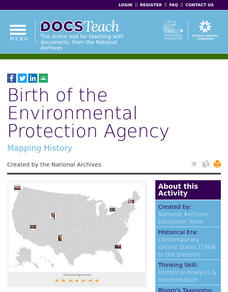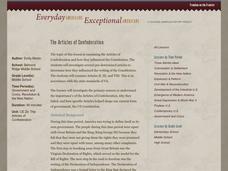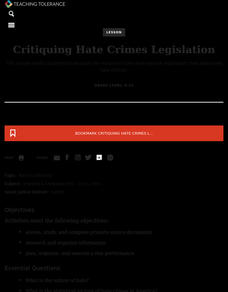iCivics
Wanted: A Just Right Government
What type of government did American colonists gain and seek after gaining their independence after the Revolutionary War? Here is activity that will guide your young learners through the new nation's progression from the Articles of...
Curated OER
Our Classroom Constitution
Develop a system of classroom rules created by the kids, for the kids with this three-part lesson series on the US Constitution. After learning about the structure of the Constitution and the government it established, young scholars...
DocsTeach
Birth of the Environmental Protection Agency
Seeing is believing when it comes to climate change. An informative activity explores the creation of the Environmental Protection Agency (EPA) and its efforts to document environmental issues with photographs. Academics match images...
American Bar Association
What Is Separation of Powers?
Who has the power? Scholars investigate the creation of the three branches of government in the United States Constitution. They analyze just why the framers created the branches the way they did.
iCivics
County Basics
To understand the concept of a county government system, scholars read a short passage, view a helpful visual aid, use the web to conduct some research about their local areas, and then answer related questions online.
Curated OER
How was the Constitution Used to Organize the New Government?
How did the United States Congress determine how the new president and vice president would be named when the nation was first established? Who would provide money for the government, and how would the executive branch be organized?
National Constitution Center
Separation of Powers
Learners explore how the Constitution provides for separation of power and limited government, as evidenced by the three branches of government. They participate in role-playing situations, group discussions, and complete worksheets to...
C-SPAN
Middle School Checks and Balances
Seven video clips reveal how the checks and balances built into the constitutional framework of the United states' government are designed to keep any one branch from becoming too powerful. After watching each clip, groups identify the...
National Endowment for the Humanities
Lesson 4 James Madison: Internal Improvements Balancing Act—Federal/State and Executive/Legislative
Who has the power? The founding fathers asked the same question when the United States was formed. Learners explore issues that arose during Madison’s presidency that raised constitutional questions. Through discovery, discussion, and...
Roy Rosenzweig Center for History and New Media
The Articles of Confederation
Have you ever started a project only to realize you need to scrap it and start over? Scholars analyze the issues leading to the fall of the Articles of Confederation. A group investigation into Articles II, III, and VIII unveil the...
Judicial Learning Center
The Constitution and Rights
What's the right way to teach young historians about the Bill of Rights? Many an instructor has asked this question when pondering lesson plans over the US Constitution. The Constitution and Rights is a nifty resource that provides a...
The New York Times
Where to Draw the Line: Balancing Government Surveillance with the Fourth Amendment
The question of how to balance Fourth Amendment Rights with national security concerns becomes critical in an age of planned terrorist attacks, election interference, and fake news. Get young social scientists involved in the debate with...
Curated OER
Lesson 4: The Judiciary: A Brief Introduction to the Courts System
Focusing on the judicial branch of government, the fourth lesson in this series explores the structure of the US courts system. Beginning with an engaging activity based on the short story The Lady or the Tiger, students go on to examine...
Center for Civic Education
What Is Authority?
Young scholars examine the concepts of power and authority as they begin learning about government in this elementary social studies lesson. Through a series of readings, discussions, and problem solving activities, children learn about...
Roy Rosenzweig Center for History and New Media
Reconstruction
When slavery ended, what did the government do to help African American during Reconstruction? An interesting instructional activity uses primary sources such as newspaper articles to help scholars analyze Reconstruction policies and how...
iCivics
Separation of Powers
In a fun and informative simulation, your learners will act in groups as lead chefs, menu writers, and nutrition inspectors in deciding a new school lunch menu. They will then compare and contrast their experience to the interaction...
Curated OER
Lesson 2: The Constitution: Our Guiding Document
Explore the structure and content of the US Constitution in the second instructional activity of this five-part social studies series. A collection of activities, games, and videos complement a class reading of a document summarizing the...
iCivics
iCivics Backyard Adventure
Imagine arguing a real Supreme Court case! Running your own county government! Acting as President for a day! iCivics offers games, web scavenger hunts, and other activities that encourage summer scholars to learn about their communities...
Digital History
Representation: By State or by Population
Should representation in the new United States government be based on population? This worksheet illustrates the details of this important quandary through an adaptation of speeches on the topic given at the Constitutional Convention....
Constitutional Rights Foundation
270 Votes to Win: The Electoral College in the United States
What exactly is the Electoral College and how does it work? The lesson is part of a larger series on government that explains what the Electoral College is and how it helps determine an election winner. Academics participate in...
C-SPAN
What Are Ways for Youth to Engage in Politics?
Help young people become excited to participate in politics. High school historians participate in an engaging lesson focused on ways for youth to become involved in government. Scholars review articles, videos, and essential vocabulary...
Teaching Tolerance
Critiquing Hate Crimes Legislation
The high school instructional activity explores what hate crimes are and how the government has responded to those crimes. Academics read legislation, analyze political cartoons, and complete hands-on-activities to understand what...
iCivics
Congress
Through reading materials, worksheets, and a primary source activity, this resource provides an overview of the structure and powers of the legislative branch of government in the United States. Readings review how a bill becomes a law,...
Learning to Give
Why Volunteer?
Inspire scholars to volunteer their time to make a positive change in their community. With help from research, a public speaker, and reflection, learners define and asses what it takes to be a volunteer in a business, non-profit,...
Other popular searches
- U.s. Government
- Branches of Government
- Three Branches of Government
- 3 Branches of Government
- Types of Government
- State Government
- Forms of Government
- Local Government
- Canadian Government
- Us Government
- Government Agencies
- American Government

























